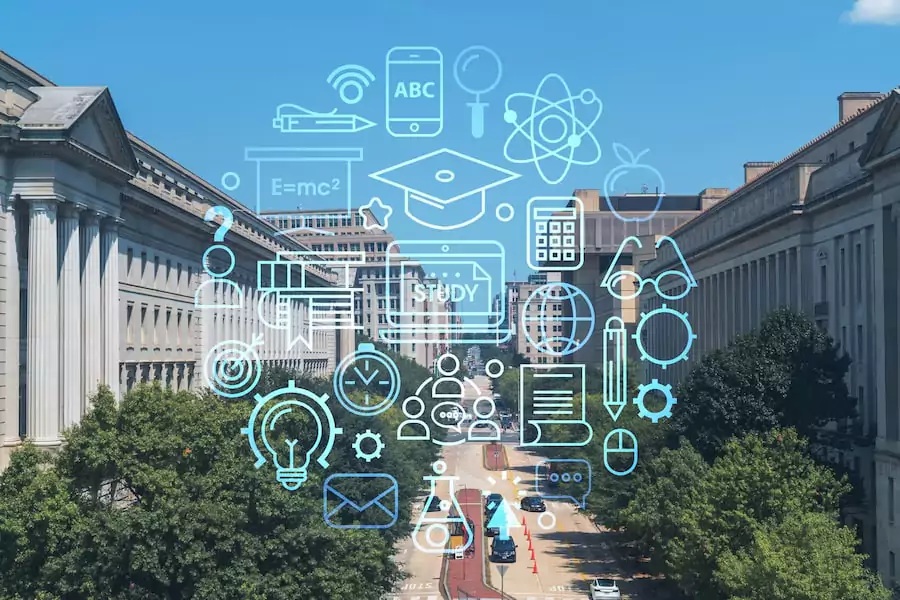Education reform is dying. Now we can actually reform education. Such acute concerns were recently voiced in a recent article for The Washington Post. The piece tackles the changing landscape of education in the United States, emphasizing the shift away from the traditional education reform movement. But what is taking its place, and how will this new approach alter the course of American education?

✅ AI Essay Writer ✅ AI Detector ✅ Plagchecker ✅ Paraphraser
✅ Summarizer ✅ Citation Generator

Key Takeaways:
- Education reform in the U.S. is changing. It now focuses more on learning, creativity, integration, and citizenship.
- We are rethinking the link between college degrees and economic success. Skills and capabilities are becoming more important than academic qualifications.
- The rise of education debt is a serious issue. We need to make education at all levels more accessible, affordable, and high-quality.
Education Reform: A Fading Priority?
For decades, the bipartisan education reform movement in America focused on job credentialing, using test scores as the primary metric for success. As Bacon Jr. points out, the current administration under President Joe Biden, marks a departure from this approach. Instead of viewing education as the main tool for higher-paying jobs and poverty reduction, the administration has begun to emphasize the value of learning, creativity, integration, and citizenship.
Redefining the Importance of College Degrees
The American education system has long equated economic advancement with college degrees, often overlooking the value of learning for its own sake. The shift in the education agenda has led to discussions on reducing the emphasis on college degrees for job qualifications. As it is noted, “There is a push from experts and politicians across partisan lines, including from Biden, to get employers to stop requiring college degrees for so many jobs.”
The Bipartisan Education Fixation’s Aftermath
For a long time, both political parties focused a lot on education. This led to more charter and magnet schools, a big push to get better test scores, and a system that punished schools and teachers if students didn’t score well on tests.

“The problem is that this education push didn’t work,” the author underscores. Despite increasing graduation rates, the economic growth and poverty reduction promised by the education reform movement have largely failed to materialize.
Addressing Economic and Racial Inequality
The previous focus on education as a tool for economic and racial inequality resolution has proven inadequate. The emergence of movements like Black Lives Matter, the loss of manufacturing jobs, and the increasing demand for free college highlight the growing dissatisfaction with the status quo. As the Biden administration works to create jobs for non-college graduates and expand services like Medicaid, the question remains: “what should the real aim of education policy be?”
A New Vision for American Education
The focus of education should not solely be on job credentialing but on fostering critical thinking, good citizenship, and an appreciation for diverse fields of knowledge. “Our education system should be about learning,” and this is the main point of the narrative. It should equip students with core skills for jobs requiring higher education, without burying them in education debt.
Redefining the Goals of Education
Education reform is at a crossroads in America. As the traditional focus on test scores and job credentialing wanes, a new approach centered on learning, creativity, integration, and citizenship is emerging. It is a transformation that is long overdue. As Jon Shelton, a professor at the University of Wisconsin at Green Bay, puts it, “we need to focus on being the institutions that are going to help society solve these bigger problems.”
Addressing Urgent Concerns
A big worry with the change in education reform is a growing wealth gap. More high-paying jobs need degrees now, and education costs are going up. This makes it harder for poor families to move up economically. The problem gets worse as student debt keeps increasing, leaving many students in financial trouble even after they finish school.
In response to these pressing issues, there is an urgent need for action on multiple fronts. Firstly, the government and educational institutions must work collaboratively to make higher education more accessible and affordable, potentially through expanded grants and scholarships, or by exploring free college education options. Secondly, employers need to reconsider the necessity of college degrees for certain positions, focusing more on skills and capabilities rather than credentials. Lastly, there should be an emphasis on providing quality education at all levels, from pre-schools through to high schools, ensuring that all students have a strong foundation of learning, critical thinking, and citizenship, regardless of their future career paths.
The Bottom Line
The education reform movement, long a fixture in American policy, is facing a significant shift. As highlighted the emphasis is moving away from job credentialing and test scores towards a more holistic view of education. This new approach prioritizes learning, creativity, integration, and citizenship, along with economic advancement and poverty reduction.
This new approach also tries to fix problems of money and race inequality that past school policies didn’t solve. As the country goes through these changes, the aim is to build a school system that really helps all students. It should encourage clear thinking, good citizenship, and give students the skills they need for the future.
Read more:
Internet of Things Security Challenges and Impact on Critical Infrastructure
NYC Schools Face ‘Quiet Problem’: A Striking Lack of Librarians
Effects of Race on Housing Inequality in New York city
Follow us on Reddit for more insights and updates.





Comments (0)
Welcome to A*Help comments!
We’re all about debate and discussion at A*Help.
We value the diverse opinions of users, so you may find points of view that you don’t agree with. And that’s cool. However, there are certain things we’re not OK with: attempts to manipulate our data in any way, for example, or the posting of discriminative, offensive, hateful, or disparaging material.